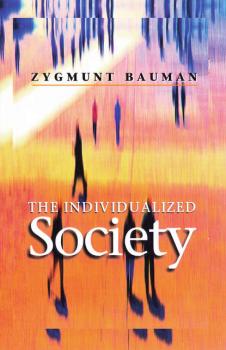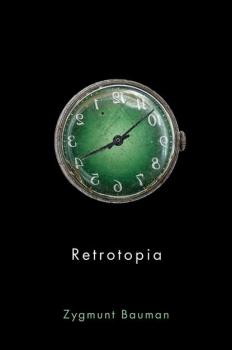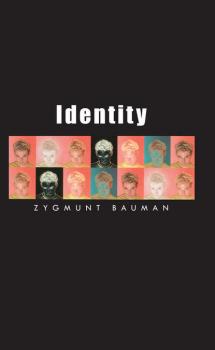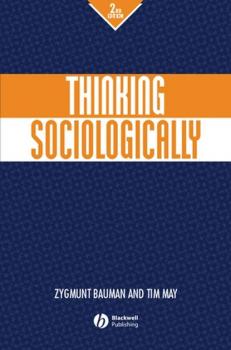Zygmunt Bauman
Список книг автора Zygmunt BaumanThe Individualized Society
We are spurred into action by our troubles and fears; but all too often our action fails to address the true causes of our worries. When trying to make sense of our lives, we tend to blame our own failings and weaknesses for our discomforts and defeats. And in doing so, we make things worse rather than better. Reasonable beings that we are, how does this happen and why does it go on happening? These are the questions addressed in this new book by Zygmunt Bauman – one of the most original and perceptive social thinkers writing today. For Bauman, the task of sociology is not to censor or correct the stories we tell of our lives, but to show that there are more ways in which our life stories can be told. By bringing into view the many complex dependencies invisible from the vantage point of private experience, sociology can help us to link our individual decisions and actions to the deeper causes of our troubles and fears – to the ways we live, to the conditions under which we act, to the socially drawn limits of our imagination and ambition. Sociology can help us to understand the processes that have shaped the society in which we live today, a society in which individualization has become our fate. And sociology can also help us to see that if our individual but shared anxieties are to be effectively tackled, they need to be addressed collectively, true to their social, not individual, nature. The Individualized Society will be of great interest to students of sociology, politics and the social sciences and humanities generally. It will also appeal to a broader range of readers who are interested in the changing nature of our social and political life today.
Retrotopia
We have long since lost our faith in the idea that human beings could achieve human happiness in some future ideal state—a state that Thomas More, writing five centuries ago, tied to a topos, a fixed place, a land, an island, a sovereign state under a wise and benevolent ruler. But while we have lost our faith in utopias of all hues, the human aspiration that made this vision so compelling has not died. Instead it is re-emerging today as a vision focused not on the future but on the past, not on a future-to-be-created but on an abandoned and undead past that we could call retrotopia. The emergence of retrotopia is interwoven with the deepening gulf between power and politics that is a defining feature of our contemporary liquid-modern world—the gulf between the ability to get things done and the capability of deciding what things need to be done, a capability once vested with the territorially sovereign state. This deepening gulf has rendered nation-states unable to deliver on their promises, giving rise to a widespread disenchantment with the idea that the future will improve the human condition and a mistrust in the ability of nation-states to make this happen. True to the utopian spirit, retrotopia derives its stimulus from the urge to rectify the failings of the present human condition—though now by resurrecting the failed and forgotten potentials of the past. Imagined aspects of the past, genuine or putative, serve as the main landmarks today in drawing the road-map to a better world. Having lost all faith in the idea of building an alternative society of the future, many turn instead to the grand ideas of the past, buried but not yet dead. Such is retrotopia, the contours of which are examined by Zygmunt Bauman in this sharp dissection of our contemporary romance with the past.
Europe
More than ever before, our conflict-ridden, drifting planet needs the qualities that Europe, unique among the continents, has developed in more than two millennia of history: its self-criticism, its urge to self-transcendence, exploration and experiment, its conviction that alternative and better forms of human togetherness can be achieved, as well as its dedication to the cause of seeking and promoting this improvement in practice. But today Europe is unsure of itself and its place in a fast-changing world; it is devoid of vision, limited in resources and lacking the will to pursue its vocation. It is also struggling with the consequences of a one-sided process of globalization which is divorcing power from politics, inciting the shift from the social state to security-focused governance and piling up the casualties of uncontrolled market expansion and the ethically blind commercialization of human life. Bauman argues that despite the odds Europe still has much to offer in dealing with the great challenges that face us in the twenty-first century. Through sharing its own hard-won historical lessons, Europe can play a vital role in moving from the Hobbesian-like world in which we find ourselves today towards the kind of peaceful unification of humanity that was once envisioned by Kant.
Community
'Community' is one of those words that feels good: it is good 'to have a community', 'to be in a community'. And 'community' feels good because of the meanings which the word conveys, all of them promising pleasures, and more often than not the kind of pleasures which we would like to experience but seem to miss. 'Community' conveys the image of a warm and comfortable place, like a fireplace at which we warm our hands on a frosty day. Out there, in the street, all sorts of dangers lie in ambush; in here, in the community, we can relax and feel safe. 'Community' stands for the kind of world which we long to inhabit but which is not, regrettably, available to us. Today 'community' is another name for paradise lost – but for a paradise which we still hope to find, as we feverishly search for the roads that may lead us there. But there is a price to be paid for the privilege of being in a community. Community promises security but seems to deprive us of freedom, of the right to be ourselves. Security and freedom are two equally precious and coveted values which could be balanced to some degree, but hardly ever fully reconciled. The tension between security and freedom, and between community and individuality, is unlikely ever to be resolved. We cannot escape the dilemma but we can take stock of the opportunities and the dangers, and at least try to avoid repeating past errors. In this important new book, Zygmunt Bauman takes stock of these opportunities and dangers and, in his distinctive and brilliant fashion, offers a much-needed reappraisal of a concept that has become central to current debates about the nature and future of our societies.
Identity
This topical new book by Zygmunt Bauman explores the notion of identity in the modern world. As we grapple with the insecurity and uncertainty of liquid modernity, Bauman argues that our socio-political, cultural, professional, religious and sexual identities are undergoing a process of continual transformation. Identities the world over have become more precarious than ever: we live in an era of constant change and disposability – whether it's last season’s outfit, or car, or even partner – and our identities as a result have become transient and deeply elusive. In a world of rapid global change where national borders are increasingly eroded, our identities are in a state of continuous flux. Identity – a notion that by its very nature is elusive and ambivalent – has become a key concept for understanding the changing nature of social life and personal experience in our contemporary, liquid modern age. In this brief book, Zygmunt Bauman explains compellingly why this is so.
Thinking Sociologically
In this lucid, stimulating and original book, Zygmunt Bauman and Tim May explore the underlying assumptions and tacit expectations which structure our view of the world. The authors elucidate key concepts in sociology: for example, individualism versus community, and privilege versus deprivation. While charting a course through sociology's main concerns, Bauman and May also examine the applicability of sociology to everyday life.
Liquid Life
'Liquid life’ is the kind of life commonly lived in our contemporary, liquid-modern society. Liquid life cannot stay on course, as liquid-modern society cannot keep its shape for long. Liquid life is a precarious life, lived under conditions of constant uncertainty. The most acute and stubborn worries that haunt this liquid life are the fears of being caught napping, of failing to catch up with fast moving events, of overlooking the ‘use by’ dates and being saddled with worthless possessions, of missing the moment calling for a change of tack and being left behind. Liquid life is also shot through by a contradiction: it ought to be a (possibly unending) series of new beginnings, yet precisely for that reason it is full of worries about swift and painless endings, without which new beginnings would be unthinkable. Among the arts of liquid-modern living and the skills needed to practice them, getting rid of things takes precedence over their acquisition. This and other challenges of life in a liquid-modern society are traced and unravelled in the successive chapters of this new book by one of the most brilliant and original social thinkers of our time.
Liquid Modernity
In this new book, Bauman examines how we have moved away from a 'heavy' and 'solid', hardware-focused modernity to a 'light' and 'liquid', software-based modernity. This passage, he argues, has brought profound change to all aspects of the human condition. The new remoteness and un-reachability of global systemic structure coupled with the unstructured and under-defined, fluid state of the immediate setting of life-politics and human togetherness, call for the rethinking of the concepts and cognitive frames used to narrate human individual experience and their joint history. This book is dedicated to this task. Bauman selects five of the basic concepts which have served to make sense of shared human life – emancipation, individuality, time/space, work and community – and traces their successive incarnations and changes of meaning. Liquid Modernity concludes the analysis undertaken in Bauman's two previous books Globalization: The Human Consequences and In Search of Politics. Together these volumes form a brilliant analysis of the changing conditions of social and political life by one of the most original thinkers writing today.
Consuming Life
With the advent of liquid modernity, the society of producers is transformed into a society of consumers. In this new consumer society, individuals become simultaneously the promoters of commodities and the commodities they promote. They are, at one and the same time, the merchandise and the marketer, the goods and the travelling salespeople. They all inhabit the same social space that is customarily described by the term the market. The test they need to pass in order to acquire the social prizes they covet requires them to recast themselves as products capable of drawing attention to themselves. This subtle and pervasive transformation of consumers into commodities is the most important feature of the society of consumers. It is the hidden truth, the deepest and most closely guarded secret, of the consumer society in which we now live. In this new book Zygmunt Bauman examines the impact of consumerist attitudes and patterns of conduct on various apparently unconnected aspects of social life politics and democracy, social divisions and stratification, communities and partnerships, identity building, the production and use of knowledge, and value preferences. The invasion and colonization of the web of human relations by the worldviews and behavioural patterns inspired and shaped by commodity markets, and the sources of resentment, dissent and occasional resistance to the occupying forces, are the central themes of this brilliant new book by one of the worlds most original and insightful social thinkers.









